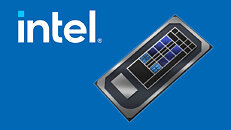- Joined
- Aug 19, 2017
- Messages
- 2,932 (1.05/day)
According to recently discovered shipping manifests, Intel is developing a new processor series codenamed "Wildcat Lake," potentially succeeding their entry-level "Intel Processor" lineup based on Alder Lake-N. The documents, revealed by x86deadandback, suggest a 2025 launch timeline for these chips targeting lightweight laptops and mini-PCs. The shipping records from October 30 mention CPU reball equipment compatible with BGA 1516 sockets, measuring 35 x 25 mm, indicating early validation testing is underway. These processors are expected to be manufactured using Intel's advanced 18A process technology, sharing the same manufacturing node as the upcoming Panther Lake series. Early technical specifications of Wildcat Lake point to a hybrid architecture combining next-generation "Cougar Cove" performance cores with "Darkmont" low-power efficiency (LPE) cores in a 2P+4LPE configuration.
This design appears to separate the core clusters, departing from traditional shared ring bus arrangements, similar to the approach taken in Intel's Lunar Lake and Arrow Lake processors. While Wildcat Lake's exact position in Intel's product stack remains unclear, it could serve as a modernized replacement for the what were Pentium and Celeron processor families. These chips traditionally power devices like Chromebooks, embedded systems, and home servers, with the new series potentially offering significant performance improvements for these market segments. The processor is expected to operate in the sub-double-digit TDP power envelope, positioning it below the more powerful Lunar Lake series. Graphics capabilities will likely be more modest than Lunar Lake's Xe2 architecture, aligning with its entry-level market positioning.

View at TechPowerUp Main Site | Source
This design appears to separate the core clusters, departing from traditional shared ring bus arrangements, similar to the approach taken in Intel's Lunar Lake and Arrow Lake processors. While Wildcat Lake's exact position in Intel's product stack remains unclear, it could serve as a modernized replacement for the what were Pentium and Celeron processor families. These chips traditionally power devices like Chromebooks, embedded systems, and home servers, with the new series potentially offering significant performance improvements for these market segments. The processor is expected to operate in the sub-double-digit TDP power envelope, positioning it below the more powerful Lunar Lake series. Graphics capabilities will likely be more modest than Lunar Lake's Xe2 architecture, aligning with its entry-level market positioning.

View at TechPowerUp Main Site | Source



